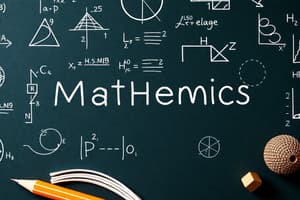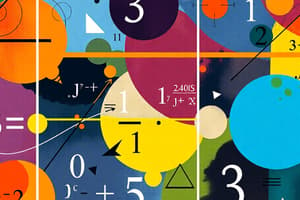Podcast
Questions and Answers
Which branch of mathematics primarily focuses on the study of shapes and their properties?
Which branch of mathematics primarily focuses on the study of shapes and their properties?
- Geometry (correct)
- Statistics
- Algebra
- Calculus
What mathematical concept describes a relationship between inputs and outputs?
What mathematical concept describes a relationship between inputs and outputs?
- Equations
- Theorems
- Sets
- Functions (correct)
Which mathematical tool is used for logical arguments to demonstrate the validity of statements?
Which mathematical tool is used for logical arguments to demonstrate the validity of statements?
- Equations
- Proofs (correct)
- Algorithms
- Inequalities
Which branch of mathematics would you use to analyze the likelihood of events occurring?
Which branch of mathematics would you use to analyze the likelihood of events occurring?
What is the primary focus of calculus in mathematics?
What is the primary focus of calculus in mathematics?
Which of the following is NOT a property of numbers studied in mathematics?
Which of the following is NOT a property of numbers studied in mathematics?
In which field of mathematics is the study of functions most commonly associated?
In which field of mathematics is the study of functions most commonly associated?
Which branch of mathematics focuses on the study of objects that can be counted individually?
Which branch of mathematics focuses on the study of objects that can be counted individually?
Flashcards
Mathematics
Mathematics
A science dealing with logic, quantity, and arrangement, involving numbers, shapes, and patterns.
Branches of Mathematics
Branches of Mathematics
Divisions of mathematics including arithmetic, algebra, geometry, calculus, statistics, and more.
Algebra
Algebra
The study of variables and their relationships through equations and formulas.
Geometry
Geometry
Signup and view all the flashcards
Calculus
Calculus
Signup and view all the flashcards
Statistics
Statistics
Signup and view all the flashcards
Probability
Probability
Signup and view all the flashcards
Functions
Functions
Signup and view all the flashcards
Study Notes
Fundamental Concepts
- Mathematics is a science that deals with logic, quantity, and arrangement.
- It involves studying numbers, shapes, and patterns.
- It uses symbols and formulas to represent abstract ideas and solve problems.
Branches of Mathematics
- Arithmetic: Study of numbers, operations, and their properties.
- Algebra: Study of variables and their relationships through equations and formulas.
- Geometry: Study of shapes and their properties, including lines, angles, surfaces, and solids.
- Calculus: Study of change and motion; uses derivatives and integrals to analyze functions.
- Statistics: Study of data collection, organization, analysis, and interpretation.
- Probability: Study of the likelihood of events occurring.
- Discrete Mathematics: Study of objects that can be counted individually.
- Number Theory: Study of properties of numbers, including prime numbers, factorization, etc.
- Trigonometry: Study of relationships between angles and sides of triangles, using functions like sine, cosine, and tangent.
Key Mathematical Concepts
- Numbers: Integers, rational numbers, irrational numbers, real numbers, complex numbers, and their properties.
- Sets: Collections of objects, operations on sets and their applications.
- Functions: A relationship between inputs and outputs, graphed on coordinate planes.
- Limits: Studying the behavior of a function as the input approaches a certain value.
- Derivatives: Rate of change of a function.
- Integrals: Area under the curve of a function.
Mathematical Tools and Techniques
- Equations: Statements of equality between expressions.
- Inequalities: Statements of greater than or less than relationships.
- Formulas: Rules for calculation in different fields e.g., area of a circle, volume of a cone.
- Proofs: Logical arguments used to demonstrate the validity of mathematical statements.
- Theorems: Proven mathematical statements.
- Algorithms: Set of steps to solve a mathematical problem.
- Data Structures: Methods used to store and organize data.
Applications of Mathematics
- Sciences (physics, chemistry, biology): modeling and prediction.
- Engineering: designing and analyzing structures, processes.
- Computer Science: developing algorithms, designing software.
- Finance: managing money, investments.
- Economics: modeling economies, predicting trends.
- Statistics: analyzing data in all fields.
- Medicine: modeling diseases, treatment strategies, drug discovery.
Mathematical Notation
- Symbols and abbreviations used to represent concepts and calculations clearly.
- Provides concise and standardized way to communicate mathematical ideas.
Studying That Suits You
Use AI to generate personalized quizzes and flashcards to suit your learning preferences.




